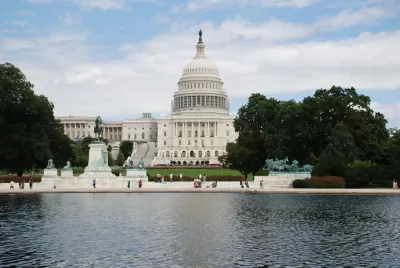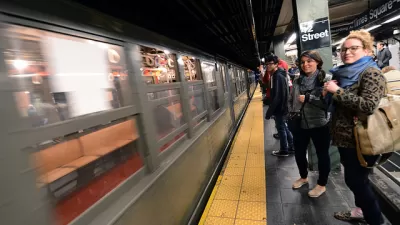Funding for Caltrain electrification, which Transportation Secretary Chao approved May 22, is one of 21 transit projects receiving funding in the omnibus spending bill that may be contingent on approval from the Trump Administration.

One down, 20 to go. Funding for the other 20 transit projects included in the $1.1 trillion omnibus spending bill signed by President Trump on May 5 may be contingent on whether they have a signed Full Funding Grant Agreement from the Federal Transit Administration.
"All of the projects were described by Congress as either ready to start immediately or able to break ground later this year," report Ashley Halsey III and Katherine Shaver for The Washington Post.
The three priciest projects on the list funded in the omnibus bill this month are the Purple Line light-rail project in Maryland, an extension of a light-rail system in Seattle, and the Caltrain plan.
Caltrain
Secretary Elaine Chao, after much pressure from California's highest elected leaders, including Gov. Jerry Brown and Senators Feinstein and Harris, and major business groups, relented on May 22 and agreed to sign a Full Funding Grant Agreement (FFGA) for the $647 million capital investment grant. The $100 million appropriation in the omnibus bill can now be released for the $1.9 billion modernization project which also included installing positive train control on the 51-mile San Jose-to-San Francisco commuter rail line, and future appropriations would seem secure.
Sound Transit
Another $100 million will go to Sound Transit's Lynnwood Link Extension in Seattle, according to Progressive Railroading.
The funding is the first installment of a potential $1.174 billion full funding grant agreement for the project, which calls for extending light-rail service from Northgate Mall in Seattle to Lynnwood, Wash.
However, the $100 million may not be accessible to Sound Transit without a signed full funding grant agreement as was the case with the aforementioned $100 million directed to Caltrain in the omnibus bill. According the The Seattle Times transit reporter, Mike Lindblom, the FFGA is scheduled to be signed in mid-2018 [see the 'correction' noted at the end of his updated March 17 article on the Lynnwood Link extension].
In a February 9, 2016 article, Lindblom reports that $1.2 billion for the project had been awarded by the Federal Transportation Administration under President Obama. As Halsey and Shave explain further below, the signing of the FFGA is considered a formality after certain approvals have been received.
Maryland Transit Administration
The stars don't seem to be aligning for releasing the $125 million appropriated to the Purple Line, overseen by the Maryland Transit Administration, in the omnibus due to its legal problems, most recently posted on May 23. "The $125 million is contingent upon a federal agreement for the project being reached before the fiscal year ends in September...," reported on
Maryland officials were four days from signing such an agreement in August, but the federal government postponed the ceremony indefinitely Aug. 4 after a federal judge revoked the line’s environmental approval, which made it ineligible for federal funding.
Notwithstanding the legal challenge, Shaver reported on May 24 that the stalled line is still under consideration by the FTA for the $900 million in federal funding requested by the Maryland Transit Administration.
"Also approved by Congress but awaiting final approval at DOT are transit projects in New York, Texas, Arizona, Florida, Indiana, Michigan, Missouri and New Mexico," add Halsey and Shaver.
Planetizen editor James Brasuell, who has been following the Southwest Light Rail Transit project in Minneapolis, Minnesota since 2014, reports that $10 million was appropriated toward the $1.858 billion project that awaits a "Caltrain-like" showdown in terms of whether Chao will sign the FFGA to enable future appropriations.
Halsey and Shaver describe the multiple steps needed "for admission to the Capital Investment Grant (CIG) program" and funding by Congress, a competitive process. [See FTA's complete list of projects and type of grants].
The final step, normally considered a formality [that explains the aforementioned Seattle light rail extension], is the signing of a Full Funding Grant Agreement (FFGA), which stipulates the percentage the federal government will pay toward the total cost of a project and how much money it will provide each year. Most projects take several years to complete, and the agreement binds the federal government to keep its commitment until the project is finished.
"Pure incompetence"
The most enlightening part of the article is the description of Secretary Chao's response to a May 19 letter written by "25 Democratic senators and Bernie Sanders (I-Vt.) [to] Chao and Mick Mulvaney, director of the Office of Management and Budget, ... urging them to 'immediately advance the billions in shovel-ready public transportation projects around the country that could break ground this year.'”
The letter said, “Many Americans voted for the president based on his promise to rebuild our nation’s infrastructure. We urge you to keep that promise by funding and advancing the billions in transit projects currently in the CIG program’s pipeline.”
A senior Senate official, who said that Chao’s response at the hearing “made sense to nobody up here” on Capitol Hill, added, “This is proof positive that it’s pure incompetence in the Trump administration — not red tape — that’s holding up billions of dollars in job-creating projects.”
Hat tip to AASHTO Journal.
FULL STORY: Federal Transit Administration signs off on one project Monday, but more than a dozen others await money

Planetizen Federal Action Tracker
A weekly monitor of how Trump’s orders and actions are impacting planners and planning in America.

Congressman Proposes Bill to Rename DC Metro “Trump Train”
The Make Autorail Great Again Act would withhold federal funding to the system until the Washington Metropolitan Area Transit Authority (WMATA), rebrands as the Washington Metropolitan Authority for Greater Access (WMAGA).

The Simple Legislative Tool Transforming Vacant Downtowns
In California, Michigan and Georgia, an easy win is bringing dollars — and delight — back to city centers.

The States Losing Rural Delivery Rooms at an Alarming Pace
In some states, as few as 9% of rural hospitals still deliver babies. As a result, rising pre-term births, no adequate pre-term care and "harrowing" close calls are a growing reality.

The Small South Asian Republic Going all in on EVs
Thanks to one simple policy change less than five years ago, 65% of new cars in this Himalayan country are now electric.

DC Backpedals on Bike Lane Protection, Swaps Barriers for Paint
Citing aesthetic concerns, the city is removing the concrete barriers and flexposts that once separated Arizona Avenue cyclists from motor vehicles.
Urban Design for Planners 1: Software Tools
This six-course series explores essential urban design concepts using open source software and equips planners with the tools they need to participate fully in the urban design process.
Planning for Universal Design
Learn the tools for implementing Universal Design in planning regulations.
Smith Gee Studio
City of Charlotte
City of Camden Redevelopment Agency
City of Astoria
Transportation Research & Education Center (TREC) at Portland State University
US High Speed Rail Association
City of Camden Redevelopment Agency
Municipality of Princeton (NJ)





























